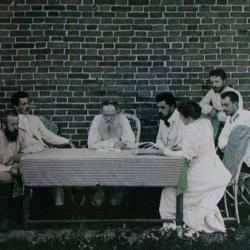Now Featured in the Patheos Book Club
The Soul of Shame:
Retelling the Stories We Believe About Ourselves
by Curt Thompson, M.D.
Facing Our Shame
"No, I'm not willing to do that." He was succinct and clear. I inquired what he felt as he imagined telling his wife about the affair. "Terrified." Of what, I asked? He could only describe in vague terms the abject sense of humiliation he would have to endure should this illicit relationship come to light.
* * * * *
She was the chief executive of a successful marketing firm and had relied on her hard-driving style to get things done. She was bewildered that her company was listing, and her effort to work harder was not effectively righting the ship. She was running out of ideas. I inquired as to whom she could ask for help. Without hesitation she informed me that to admit she needed assistance was tantamount to resigning. "I can't afford not to have ideas that work. If I have to ask for help, I will be seen as incompetent and the board will fire me."
* * * * *
"She didn't get in, and I'm worried about what this will mean for her future." This, coming from a mother who had worked diligently to do her part to help her daughter gain entrance to her top school choice. This might be understandable, except for the fact that her daughter was only three years old.
* * * * *
Why had no one protected her? By the time she was twenty-six she had slept with over fifteen men and endured two abortions. But the sex had begun when she was eleven, with an uncle who had first treated her as special, but eventually threatened her very life if she were to reveal the horror. This lasted until she was seventeen, when she left for college, where she was free of her uncle but imprisoned to the behavior that was the only path she knew to "intimacy" with a man. How in the world was she to tell her parents, let alone friends or anyone in her faith community? The only reason she was telling me was that her depression had become too overwhelming for her to function.
* * * * *
The hypothesis had finally been proven. The elegant biochemistry, the complex statistical analysis of the patients' clinical responses to the drug, and a little luck had all added up. All the work, all the long hours away from his family, all the grant money spent—it was all finally worth it. Along with this discovery would certainly come the offer of a tenured position he had long coveted and that the university would be unable to deny him. Not to mention the potential earnings once the patent came through. There was only one problem. An ethics board that was tasked to make sure his lab's research was beyond reproach had found some questionable data reporting. And before the week was over, his life was unraveling faster than he could have imagined, the result of someone's need to make history fighting cancer.
* * * * *
He began drinking when he was thirteen. He had two DUIs by the time he was twenty, the second one landing him in jail for a month. That was more than two decades ago, before he met Jesus. But in the last five years the bourbon had begun to flow again most evenings after everyone went to bed. His wife had informed him that if the drinking didn't stop, she was leaving and taking the children with her. Then there was the issue of his work. How, exactly, would he tell the people of his congregation where he had been the pastor for fifteen years? Jim Beam seemed to be the only thing that helped him hang on in the face of the burnout he felt shepherding such a challenging flock.
Our Stories of Shame
Stories. Each of us has one, and at some point the people in the previous scenarios sat in my office telling me his or hers. And theirs are just the tip of the iceberg. There are many more, each with different screenplays, each that emerges from a different family of origin, each with its own particular joys and sorrows, victories and defeats. No matter what initially brings them to see me, their stories eventually lead to the moment when what I believe to be the lowest common denominator in human relationships makes its way into the room. It matters not if the person earns a two-comma salary or works for minimum wage. She may be married or single. He may be African American or Caucasian. Depressed, anxious or just plain angry; happy, sad or indifferent. He may be the father or the son, the employer or employee. It may be an individual, a couple, family, community, school or business organization. And you needn't have ever darkened the office door of a psychiatrist. It doesn't require the breakdown of our mental health to be plagued with it. It only requires that you have a pulse. To be human is to be infected with this phenomenon we call shame.




